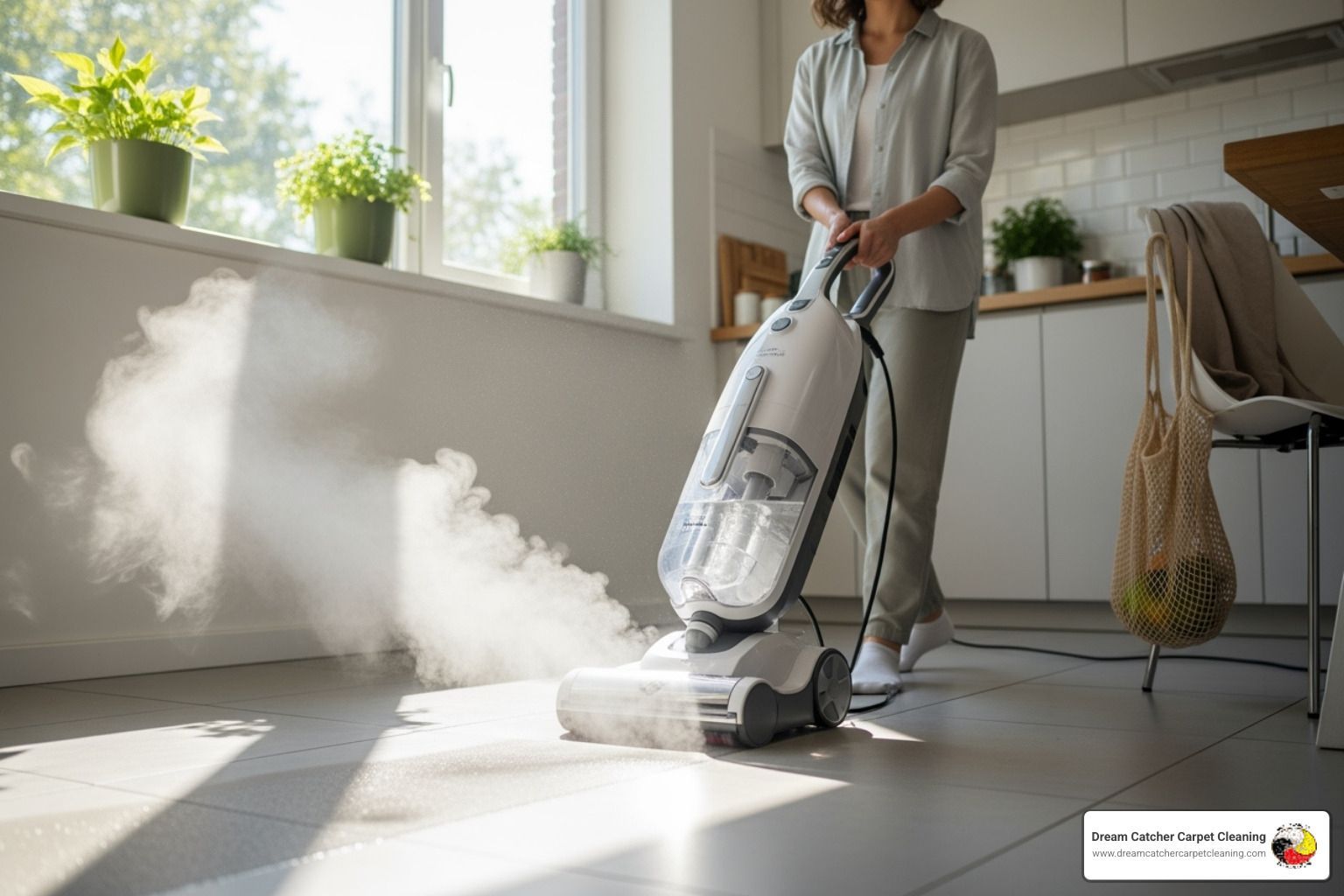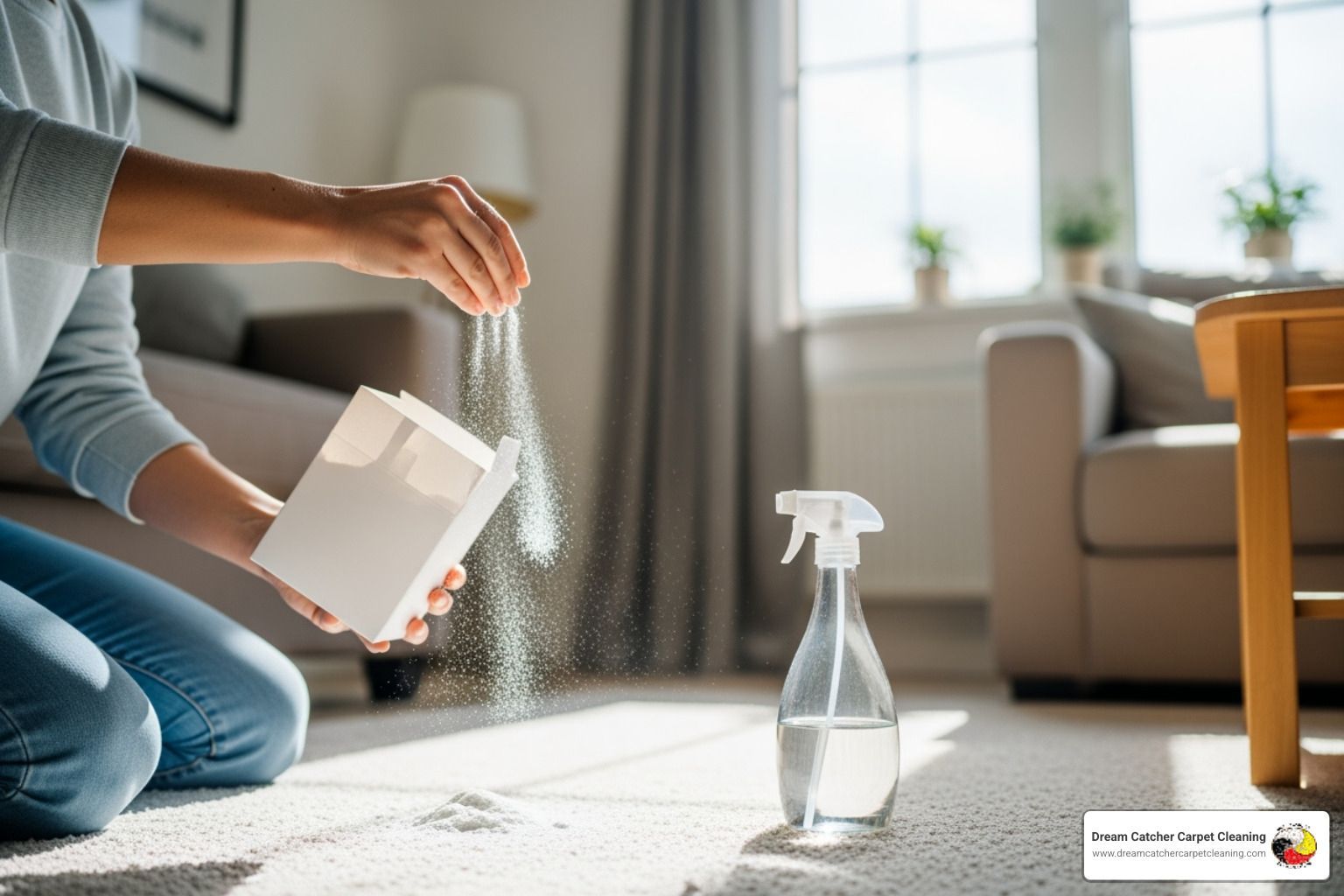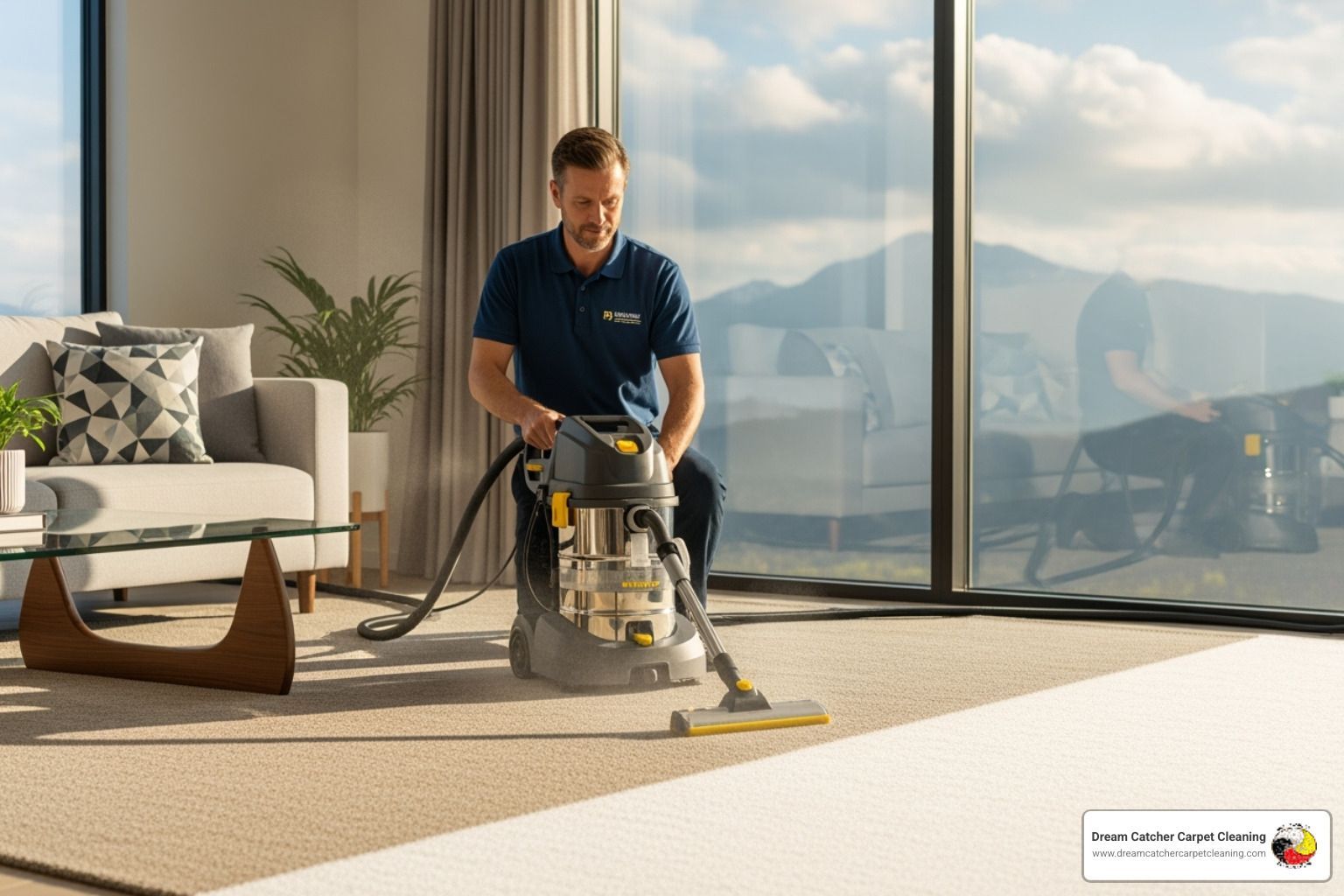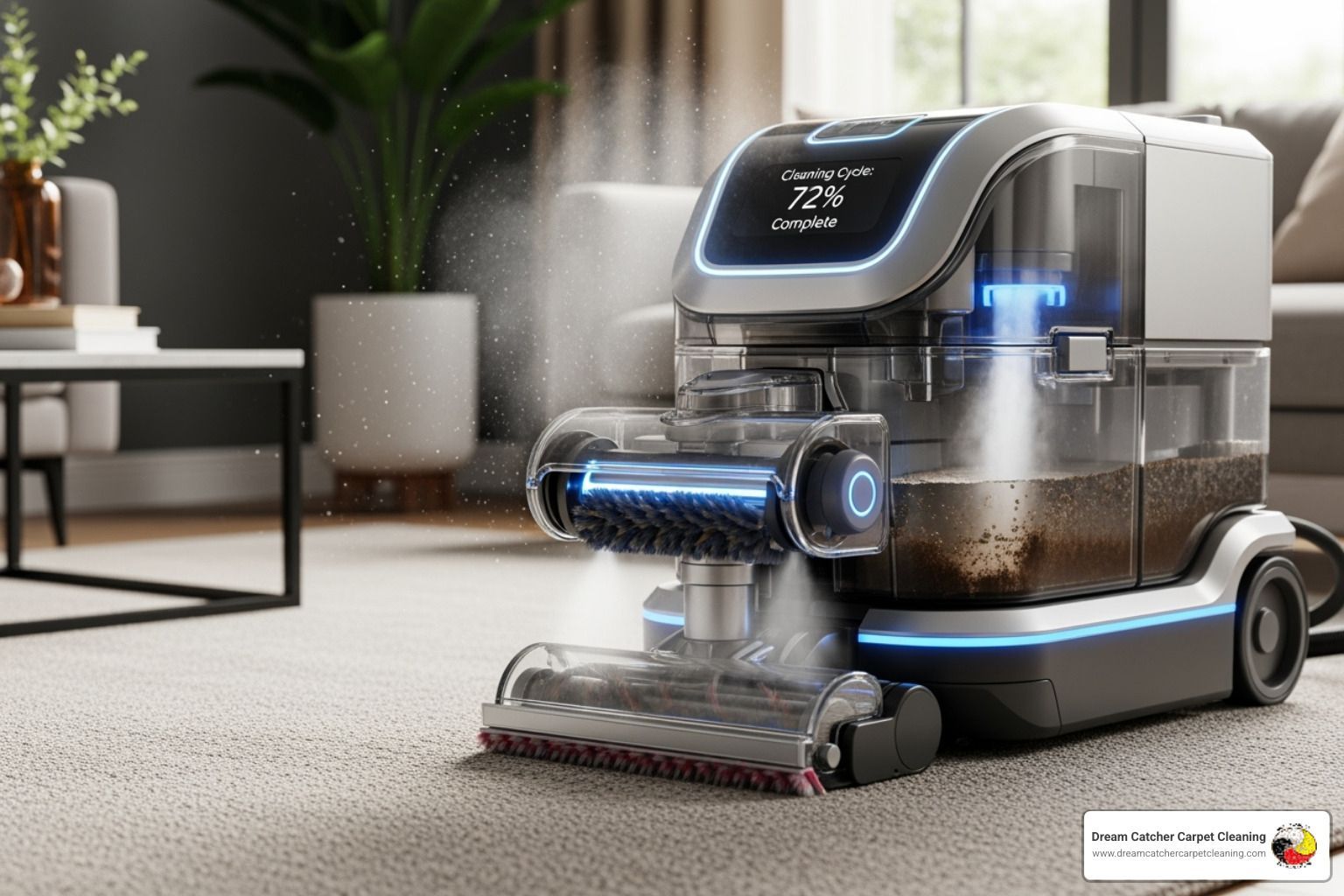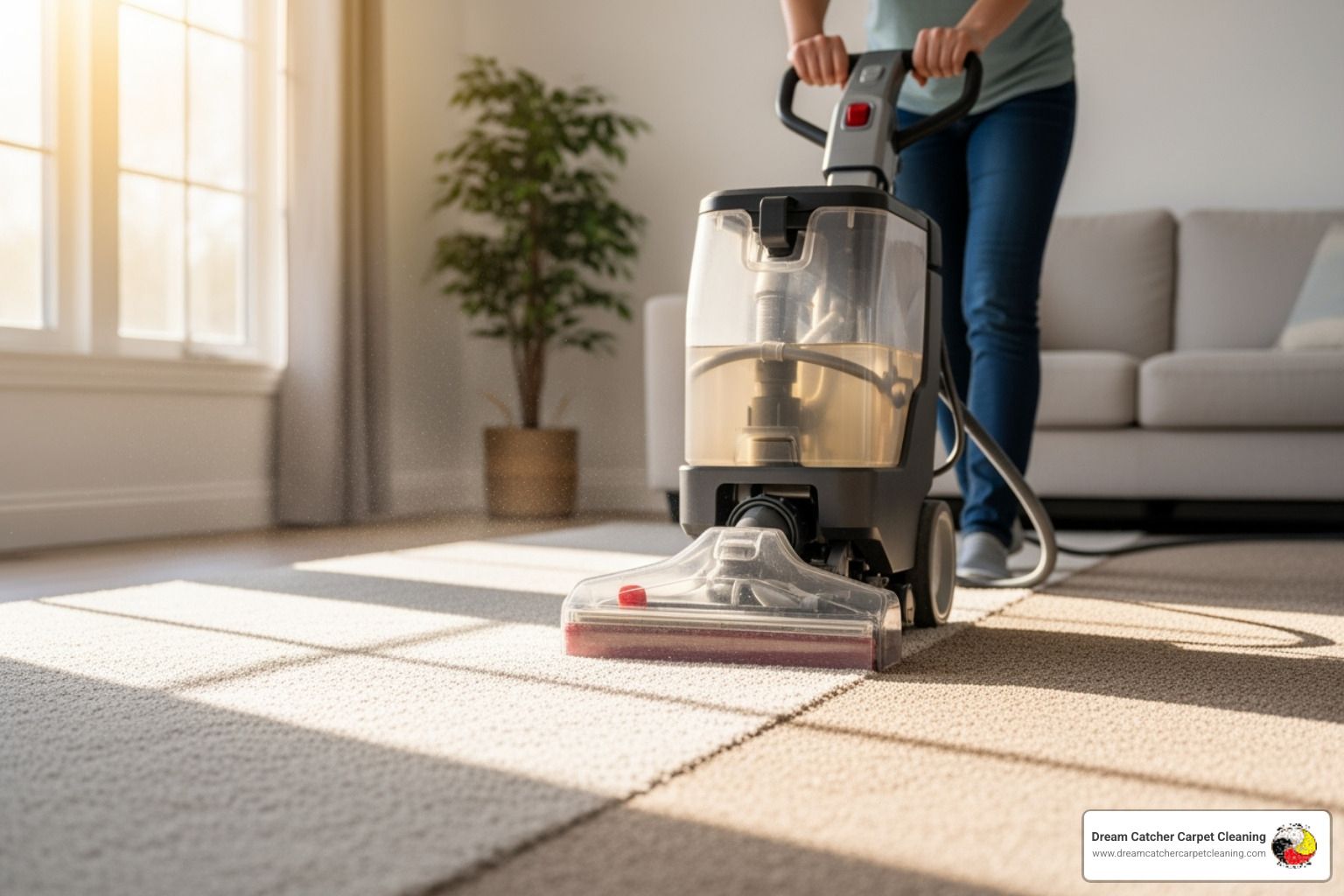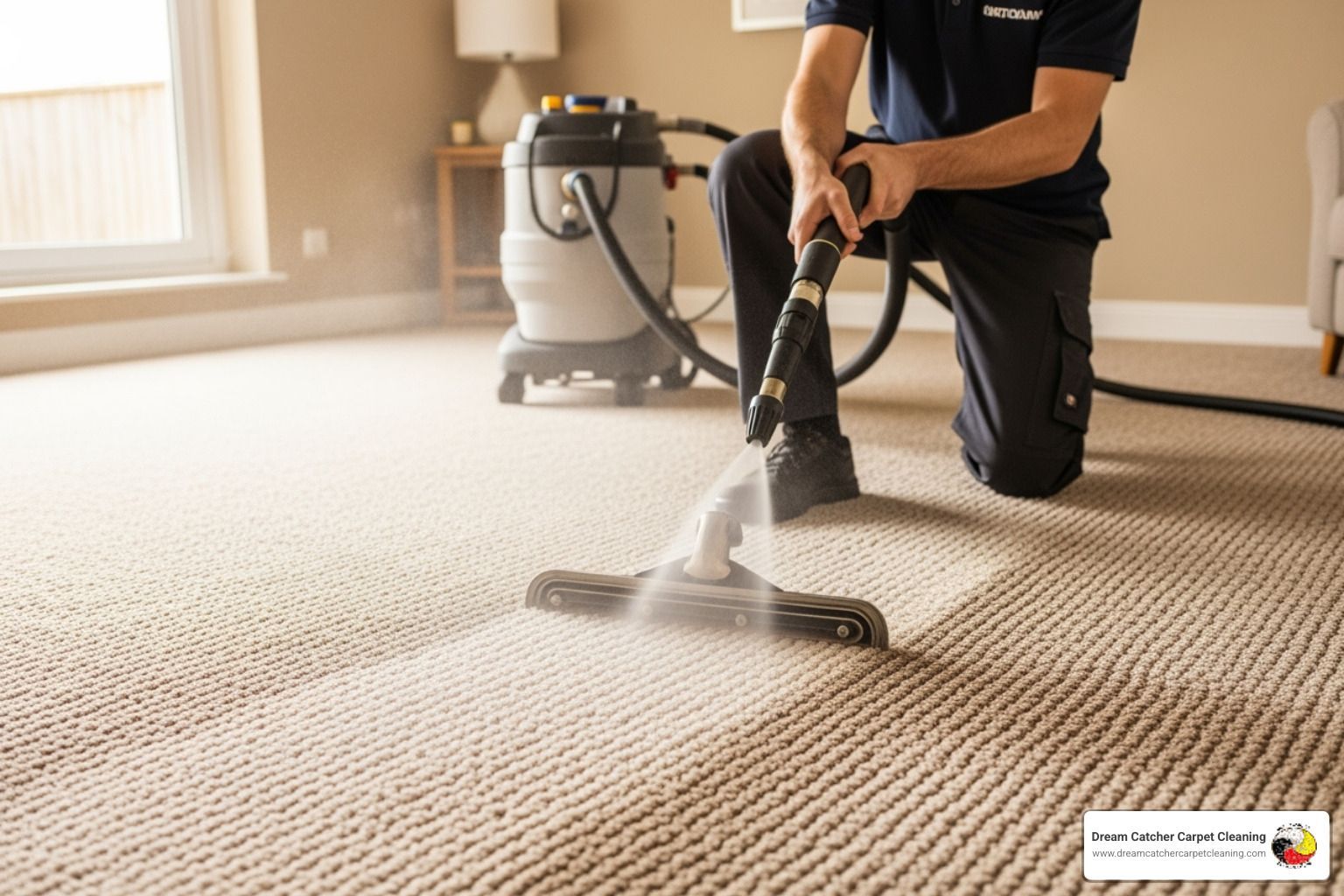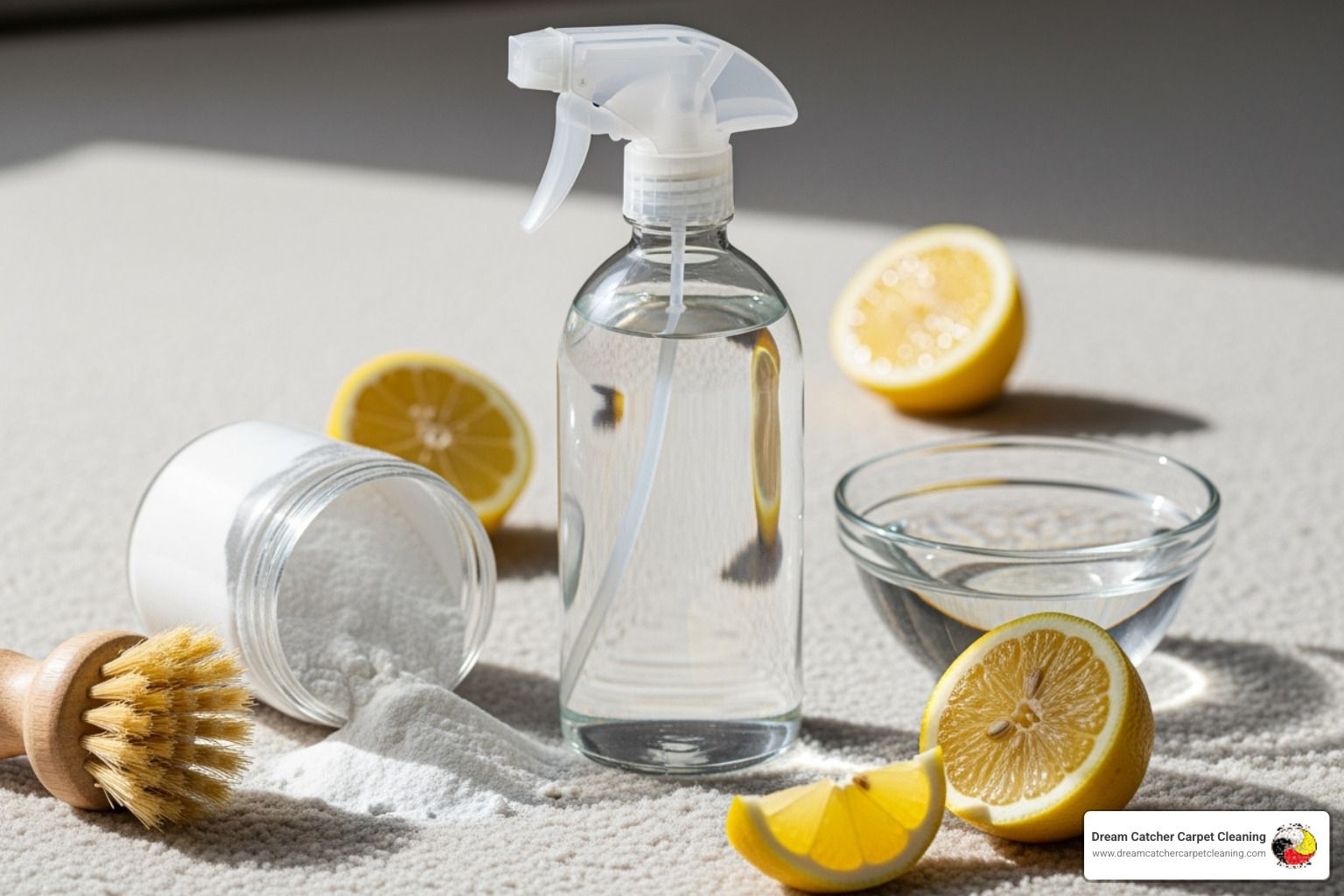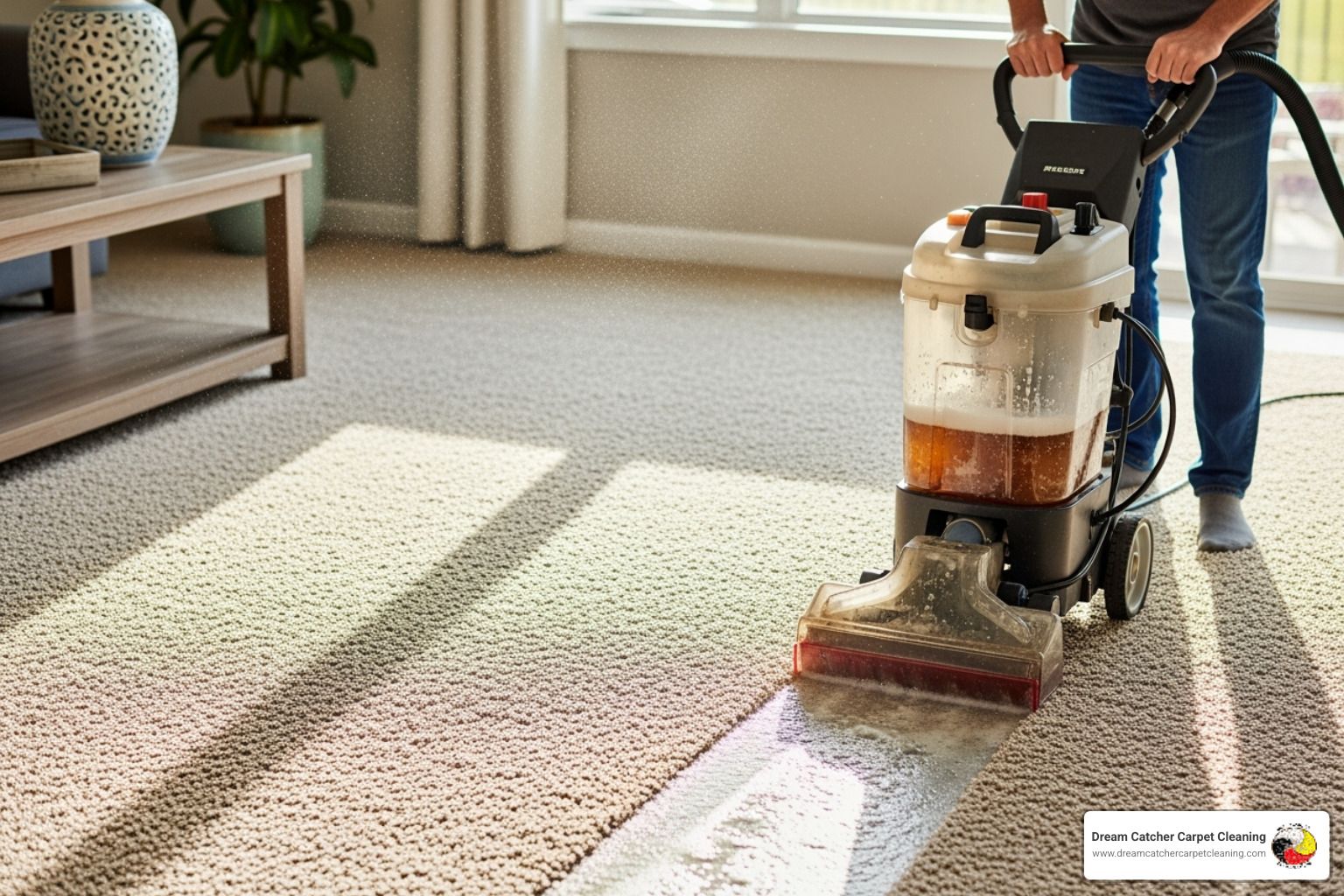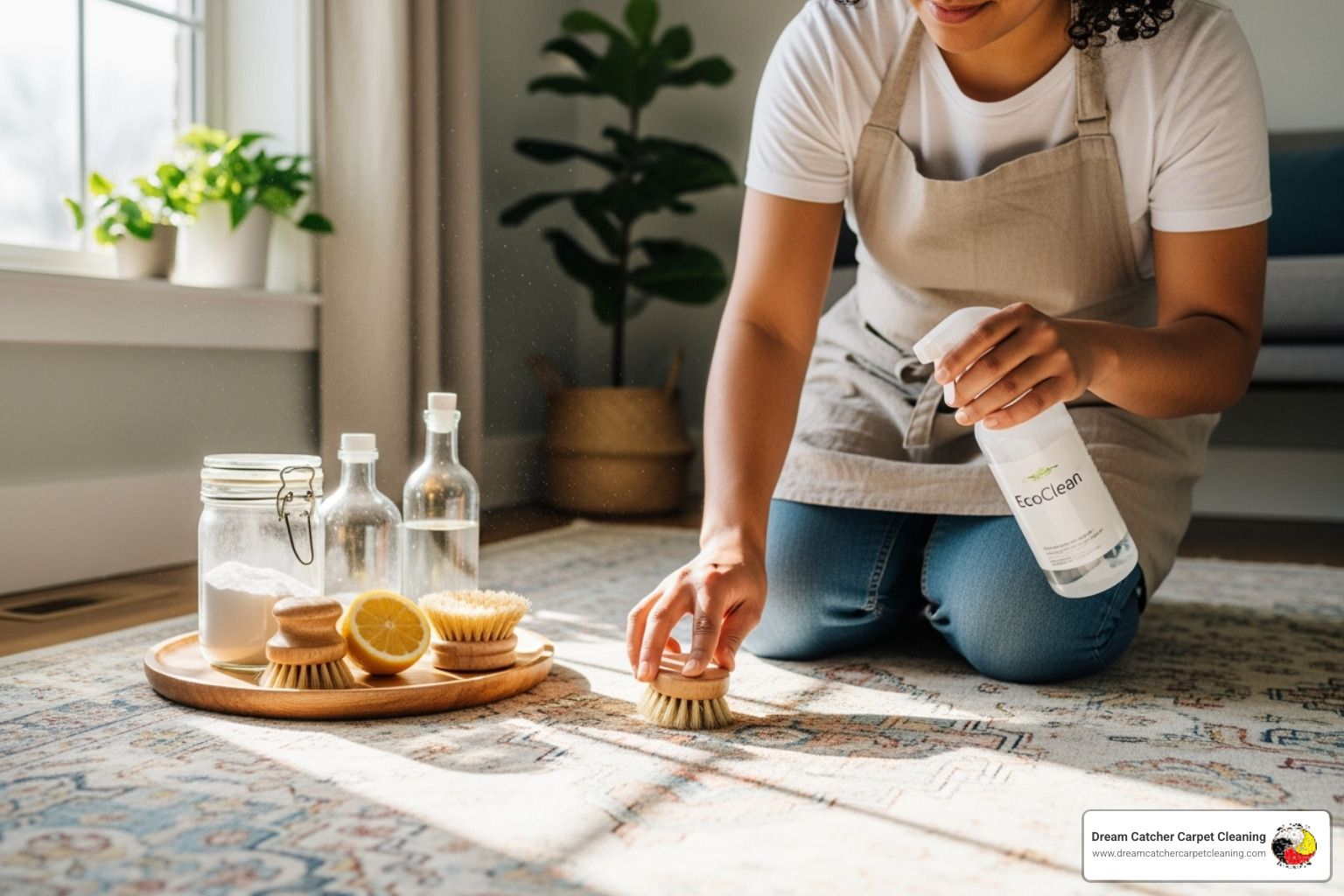The All-Too-Familiar Pet Accident
Does vinegar remove pet stains from carpets is one of the most searched questions by pet owners facing carpet emergencies. Here's the quick answer:
Yes, vinegar can effectively remove fresh pet stains from carpets through its acidic properties that neutralize odor-causing compounds. However, it has limitations:
- Works best on: Fresh urine stains, light odors, synthetic carpets
- Less effective on: Set-in stains, cat urine, natural fiber carpets
- Requires: Proper dilution (1:1 with water) and technique
- May need: Multiple applications or professional help for stubborn cases
We've all been there. You walk into your living room and find that telltale wet spot on your carpet, with your dog giving you that apologetic look. As one frustrated pet owner shared on Reddit: "It's been two weeks since my parents came to visit & they brought their dog who immediately took a shit and urinated all over my carpet. I've been cleaning/scrubbing at the area every single day since then but it STILL smells."
The good news? Vinegar can be a powerful ally in your fight against pet stains. The not-so-good news? It's not always the complete solution many people hope it will be.
I'm Clarence Smith, owner of Dream Catcher Carpet Cleaning with over 22 years of experience helping Denver families tackle tough carpet challenges. Throughout my career, I've seen countless homeowners ask does vinegar remove pet stains from carpets- and I've learned exactly when this DIY method works and when it doesn't.
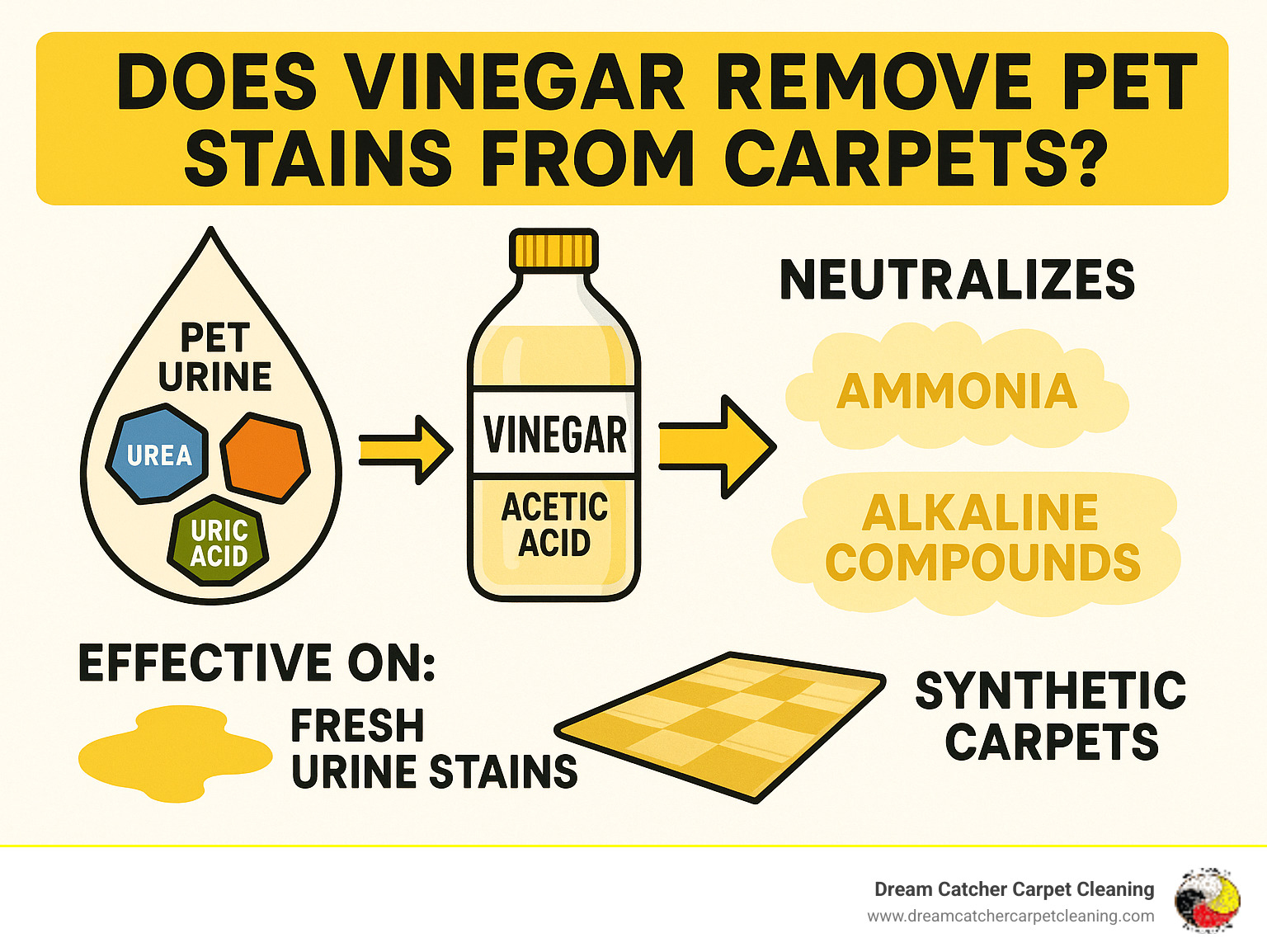
The Science: Why Vinegar Works on Pet Stains (and Its Limits)
Here's the thing about pet accidents - they're not just messy, they're chemically complex. When your furry friend has an accident, you're not dealing with plain water. Pet urine contains a cocktail of compounds including urea, creatinine, uric acid, and various alkaline salts that make cleanup more challenging than you might expect.
Fresh urine starts out slightly acidic, but here's where things get interesting. As it sits on your carpet, bacteria get to work breaking down the urea and converting it into ammonia. This process makes the stain increasingly alkaline over time - which is exactly why that two-week-old accident smells so much worse than a fresh one.
Enter white vinegar, your kitchen cabinet hero. With about 5% acetic acid concentration, vinegar brings some serious chemistry to the cleaning game. According to The Vinegar Institute , vinegar's acidic properties can break down alkaline stains and neutralize those stubborn odor-causing compounds.
How Vinegar Chemically Neutralizes Pet Urine Odor
The magic happens through what scientists call an acid-base reaction- basically, opposites attract and neutralize each other. When vinegar's acetic acid meets the alkaline compounds in dried urine, it's like a tiny chemistry experiment happening right in your carpet fibers.
This reaction does several important things. It breaks down the sticky messes that trap odor-causing bacteria, reduces that sharp ammonia smell that makes your nose wrinkle, and creates an environment where bacteria can't thrive as easily. Think of vinegar as changing the pH battlefield in your favor.
The process works because vinegar lowers the pH of alkaline urine residue, breaks down urea and other organic compounds, and creates conditions that are less welcoming to the bacteria responsible for those persistent odors. It's particularly effective on fresh stains where the chemical changes haven't had time to become deeply entrenched.
The Limitations: Why Vinegar Isn't a Miracle Cure
Now for the reality check - does vinegar remove pet stains from carpets in every situation? Unfortunately, no. While vinegar can be incredibly effective on fresh accidents, it faces some serious challenges with older, set-in stains.
The biggest troublemaker is uric acid crystals. As urine dries, uric acid forms these incredibly stubborn crystalline structures that can reactivate when exposed to moisture or humidity. You know that frustrating "phantom smell" that seems to come and go? That's usually uric acid crystals doing their thing, and vinegar alone often can't break them down effectively.
Cat urine presents an even bigger challenge. It's more concentrated than dog urine and packed with higher levels of uric acid and other compounds that create persistent odors. As noted in our guide on homemade pet urine stain and odor removers , cat accidents often require more aggressive treatment approaches.
Then there's the saturation problem. If urine has soaked through to the carpet pad or reached the subfloor, surface cleaning with vinegar only addresses part of the issue. The contamination below will continue causing odors and may even wick back up through the carpet fibers, making your cleaning efforts feel like you're fighting a losing battle.
Color-staining compounds in urine can also be particularly stubborn, especially on light-colored carpets. While vinegar might neutralize the odor, it doesn't always eliminate the visible staining that can leave embarrassing reminders of past accidents.
A Step-by-Step Guide to Cleaning Pet Stains with Vinegar
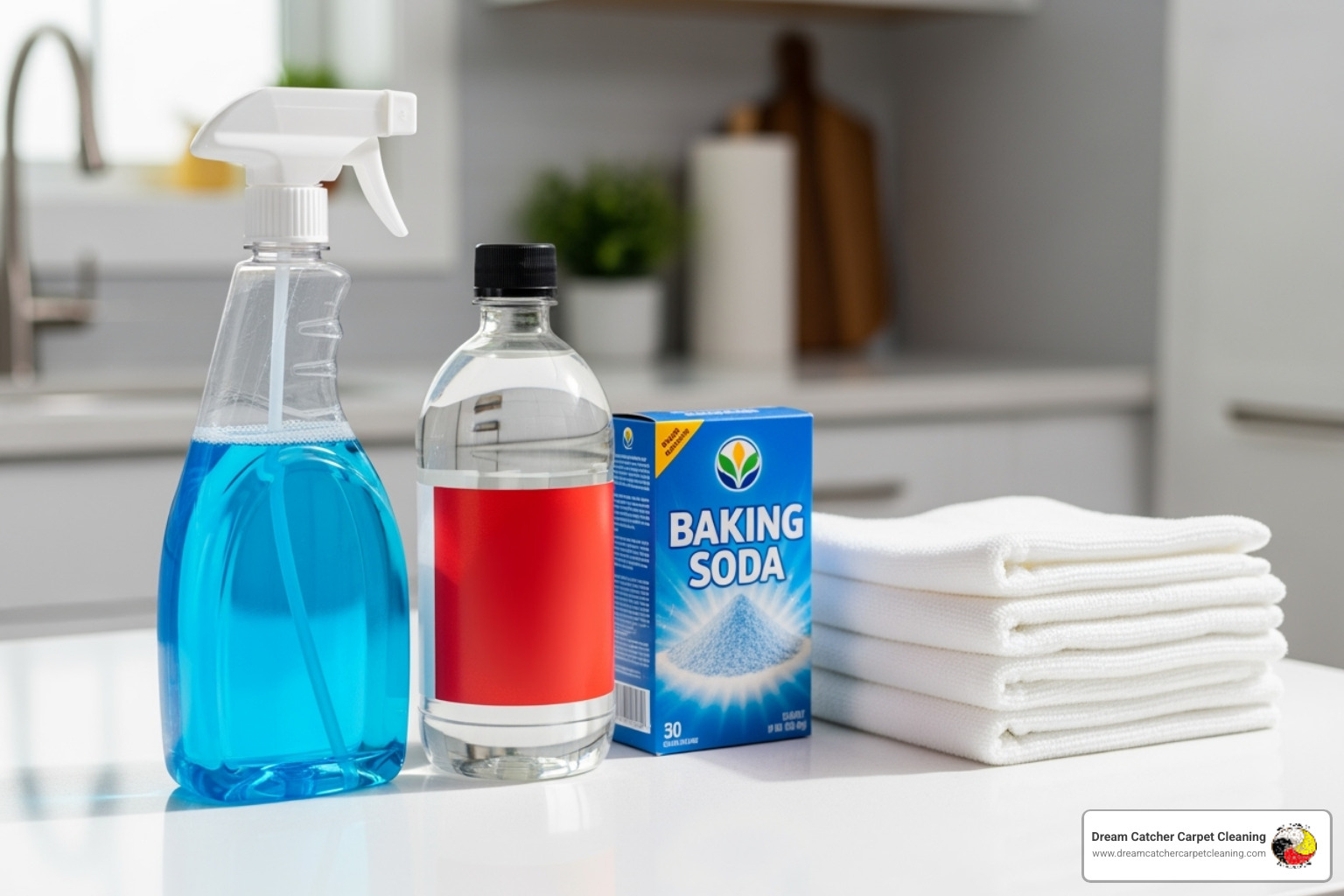
Ready to tackle that pet stain? Let's walk through the process step by step. After helping hundreds of Denver families with pet accidents, I've learned that the right technique makes all the difference when asking does vinegar remove pet stains from carpets.
The key to success lies in understanding that fresh stains and old stains need different approaches. Our homemade pet urine stain odor remover guide has proven effective for countless homeowners dealing with these frustrating situations.
Step 1: Essential Prep for Any Pet Stain
Time is your best friend when dealing with pet accidents. The moment you find that wet spot, you're in a race against chemistry. As urine sits, it becomes more alkaline and harder to remove.
Blot, never rub- this is the golden rule that separates successful stain removal from carpet disasters. Rubbing pushes urine deeper into the fibers and can actually damage your carpet's structure. Instead, grab clean paper towels or cloths and press firmly over the wet area. You'll go through several towels, and yes, they'll smell terrible, but that's actually good news - it means you're pulling the urine out of your carpet.
If you're dealing with solid waste, carefully pick it up with paper towels or a plastic bag. Work from the outside edges toward the center to avoid spreading the mess. Don't press down - just lift it away gently.
Before you start the actual cleaning, gather everything you'll need. White distilled vinegar is essential - never use colored vinegars as they can stain your carpet. You'll also need lukewarm water, a spray bottle, baking soda, plenty of clean cloths, and your vacuum cleaner.
Step 2: The Vinegar and Baking Soda "Volcano" Method
This technique gets its nickname from the satisfying fizzing reaction that happens when acid meets base. It's like a mini science experiment that actually works to neutralize pet odors.
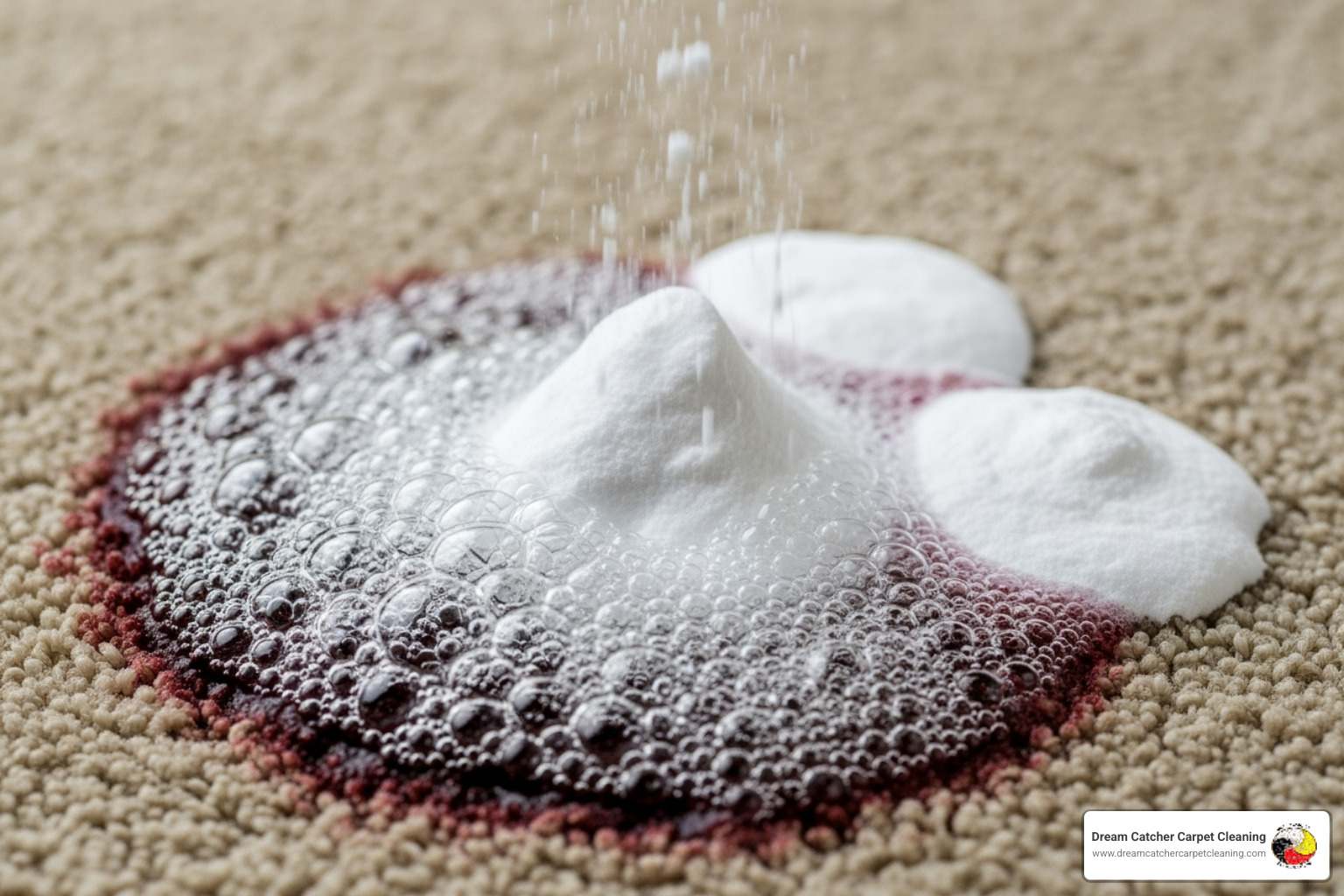
Start by creating your vinegar solution in a spray bottle. Mix equal parts white vinegar and lukewarm water- this 1:1 ratio gives you cleaning power without being too harsh on your carpet. The lukewarm water helps the vinegar penetrate better than cold water would.
Spray the solution generously over the stained area. Don't be shy here - you want the solution to reach everywhere the urine went. Let it sit for 5 to 10 minutes. During this time, the acetic acid in the vinegar is breaking down those alkaline compounds that cause the smell.
Now comes the fun part. Sprinkle a generous layer of baking soda over the treated area. You'll immediately see it start to fizz and bubble. This reaction is the acid and base neutralizing each other while the baking soda's crystal structure traps odor molecules.
Let this mixture work its magic for at least an hour. For stubborn stains, leaving it overnight can be even more effective. The baking soda will absorb both the vinegar and the broken-down urine compounds. When you vacuum it up, you're removing all that neutralized odor along with it.
For more detailed cleaning recipes, check out our DIY non-toxic carpet cleaner guide.
Step 3: Boosting Your Mix with Hydrogen Peroxide (With Caution)
Sometimes vinegar alone isn't enough, especially for older stains or particularly stubborn odors. Adding hydrogen peroxide creates a more powerful cleaning solution, but it requires extra care.
Create an improved cleaning mixture by combining equal parts 3% hydrogen peroxide with clear dish soap. This combination gives you the disinfectant properties of peroxide along with the grease-cutting power of soap. Many pet owners swear by this upgraded formula.
Apply this mixture to the stained area and let it sit for just one minute - no longer. Gently work it in with a soft brush, then rinse thoroughly with clean water. The key word here is thoroughly - you want to remove all residue to prevent any sticky buildup that could attract more dirt.
Here's the important warning: Hydrogen peroxide can bleach darker carpets. Always test this solution on a hidden area first, like inside a closet or behind furniture. I've seen too many homeowners create light spots on dark carpets by skipping this crucial step.
If you're dealing with particularly challenging stains, our guide on effective solutions for stubborn pet stains and odors offers additional techniques that might help.
So, does vinegar remove pet stains from carpets effectively? A Balanced View
After working with thousands of pet-loving families over the years, I can give you a straight answer: does vinegar remove pet stains from carpets effectively depends entirely on what you're dealing with. It's like asking if a hammer works well - it's perfect for nails, but you wouldn't use it to fix a watch.
Let me break down when vinegar shines and when it struggles, so you can set realistic expectations for your cleaning efforts.
The Pros: Why Vinegar is a Go-To for Pet Owners
There's a reason vinegar has become the first line of defense for so many pet owners. Cost-effectiveness is hard to beat - at around $2-3 per bottle, it's incredibly affordable compared to commercial cleaners that can run $15-20 each. When you're dealing with a puppy who's still learning the ropes, those savings add up quickly.
Pet safety is another huge advantage. Unlike harsh chemical cleaners that force you to evacuate the family (including your four-legged troublemaker), vinegar is completely non-toxic. Your curious cat can walk across the treated area without any concerns. This peace of mind is invaluable for families with multiple pets or small children.
The eco-friendly nature of vinegar appeals to environmentally conscious pet owners. You're not introducing synthetic chemicals into your home or washing harmful substances down the drain. It's a green solution that aligns with sustainable living values.
Availability makes vinegar incredibly practical. You probably have a bottle in your kitchen cabinet right now, making it perfect for those emergency situations when Fluffy has an accident at 10 PM and stores are closed.
Most importantly, vinegar genuinely works well on fresh stains, particularly dog urine on synthetic carpets. When you catch accidents quickly and use proper technique, vinegar can completely eliminate both the stain and odor. The odor control properties are especially impressive - that acid-base reaction really does neutralize those unpleasant ammonia smells.
The Cons: When does vinegar remove pet stains from carpets less effectively?
Here's where reality sets in. Old stains are vinegar's biggest weakness. Once urine has set and formed those stubborn uric acid crystals, vinegar alone often can't break them down completely. I've seen countless homeowners spend weeks applying vinegar to old stains, only to have the odor return when humidity rises.
Cat urine presents special challenges that vinegar simply can't handle. It's more concentrated and contains higher levels of problematic compounds. As one frustrated pet owner shared: "Even after cleaning the carpet with vinegar (and other 'biological' cleaning agents), the odor still persists." Cat accidents almost always require professional intervention.
Natural fiber carpets like wool or silk can be damaged by vinegar's acidity. If you have expensive Persian rugs or delicate natural fiber carpeting, vinegar could cause permanent damage that costs far more than professional cleaning.
The temporary vinegar smell can be overwhelming initially. While it dissipates over time, some people find it trades one unpleasant odor for another, at least temporarily. This can be particularly problematic if you're trying to eliminate odors before guests arrive.
Perhaps most importantly, deep penetration issues mean that if urine has reached the carpet pad or subfloor, surface treatment with vinegar won't address the full extent of contamination. You might think you've solved the problem, only to have odors return as moisture wicks back up from below.
The bottom line? Vinegar is an excellent first defense for fresh pet stains, but it has clear limitations that every pet owner should understand before relying on it as their only solution.
When DIY Isn't Enough: Signs You Need a Professional
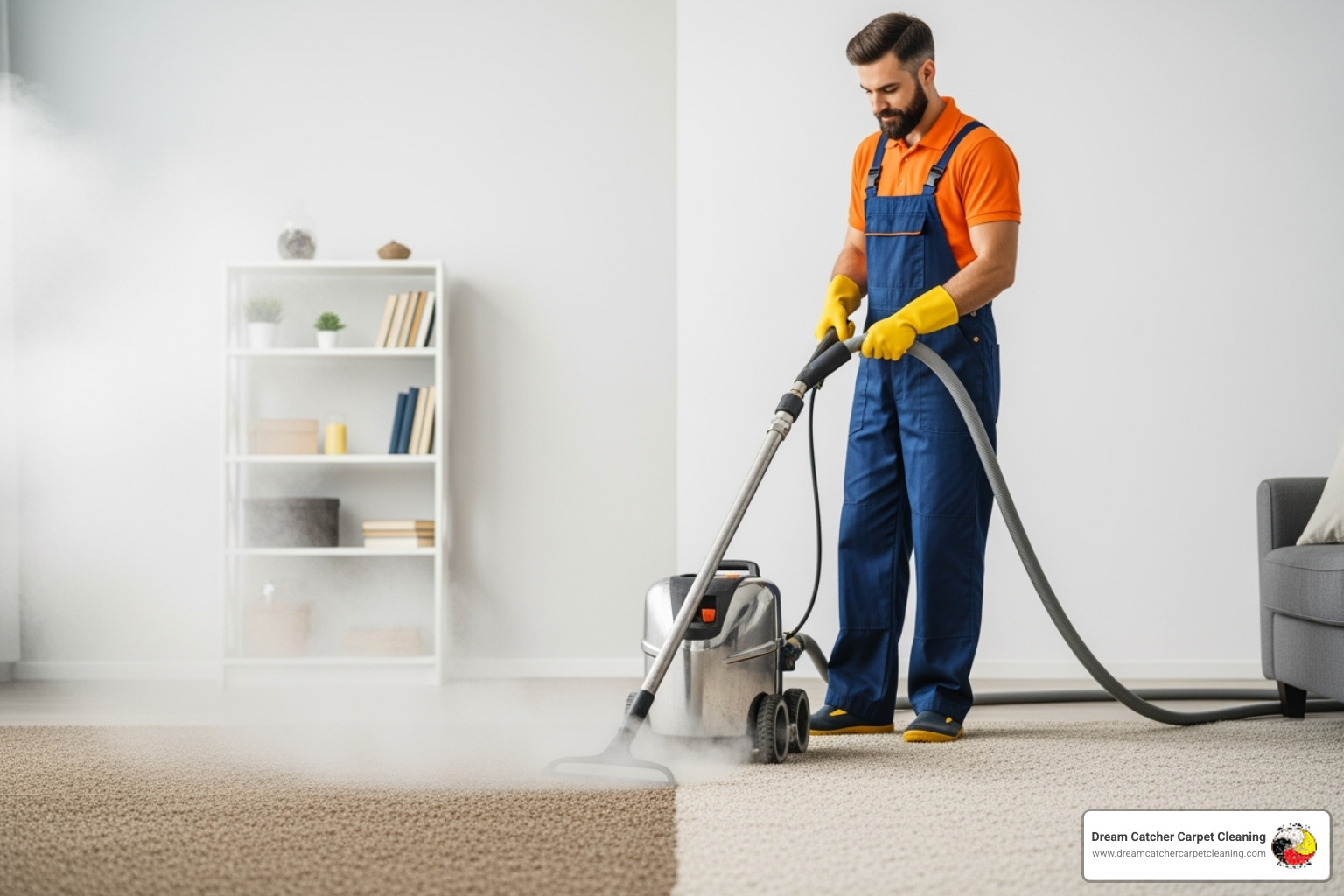
Sometimes, despite your best efforts with vinegar and other DIY methods, the problem persists. After 22 years of helping Denver families with their carpet challenges, I've learned to spot the telltale signs that does vinegar remove pet stains from carpets has reached its limits.
If you've been battling the same stain for weeks, treating it repeatedly with vinegar only to have the odor return, you're not alone. One frustrated homeowner shared their experience: "I've been cleaning/scrubbing at the area every single day since then but it STILL smells." This is your carpet's way of telling you the problem goes deeper than surface cleaning can reach.
Persistent odors after multiple treatments are the biggest red flag. When vinegar solutions stop working, it usually means the contamination has penetrated beyond the carpet fibers into areas where DIY methods simply can't reach effectively.
Reappearing stains are another clear indicator. You clean the area, it looks great, then mysteriously the stain comes back a few days later. This phenomenon, called wicking, happens when moisture from contaminated padding or subfloor travels back up through the carpet fibers.
Large stained areas or multiple accident sites often overwhelm DIY solutions. While vinegar might handle a small, fresh accident, extensive contamination requires professional-grade equipment and techniques.
Why Lingering Odors Mean a Deeper Problem
When odors persist despite your best vinegar treatments, you're dealing with contamination that has traveled through your carpet into the padding and potentially even the subfloor beneath. This creates a much more complex cleaning challenge than surface stains.
Carpet pad contamination is particularly problematic because the padding acts like a sponge, absorbing and holding urine. Even after cleaning the carpet surface, the contaminated padding continues to release odors. Vinegar applied to the carpet surface simply can't penetrate deep enough to neutralize these embedded odors.
Subfloor saturation represents the most serious level of contamination. When urine reaches wooden subfloors, it can cause permanent damage and create odors that persist for years. The porous nature of wood makes it nearly impossible to clean effectively without professional intervention.
Pet re-marking behavior often indicates incomplete odor removal. As one expert noted: "If you can smell it, the animal can definitely smell it. If the animal can smell it, they will likely mark the spot again." Your pet's sensitive nose can detect odor molecules that your DIY cleaning missed, leading to repeat accidents in the same location.
Uric acid crystals form as urine dries and can remain dormant for months. These crystals reactivate when exposed to moisture or humidity, suddenly releasing strong odors that seem to appear from nowhere. A black light test can reveal the full extent of contamination, often showing much larger affected areas than visible to the naked eye.
The Professional Advantage for Stubborn Stains
Professional carpet cleaning brings tools and techniques that DIY methods simply can't match. Our truck-mounted hot water extraction equipment heats water to temperatures that break down compounds vinegar can't touch, while powerful suction removes contamination from deep within carpet fibers.
High-powered vacuum systems can extract moisture and contaminants from carpet padding and even treat subfloors when necessary. This addresses the full extent of contamination rather than just surface stains, preventing the wicking that causes stains to reappear.
Professional-grade enzymatic treatments are specifically formulated to break down uric acid crystals and other stubborn compounds that cause persistent odors. These specialized products work at the molecular level to eliminate odor sources rather than just masking them.
Proper assessment and treatment planning ensures no contaminated areas are missed. We use professional detection methods to identify the full scope of the problem, then develop a comprehensive treatment plan that addresses all affected areas.
Stain removal expertise comes from years of experience dealing with every type of pet accident imaginable. We know which treatments work best for different carpet types, stain ages, and contamination levels.
After professional cleaning, we can apply carpet protection treatments that help prevent future stains from penetrating as deeply, making your next DIY cleaning attempt more likely to succeed.
For a detailed comparison of when to try DIY versus calling professionals, check out our guide on how to remove pet odors from your home: professional solutions vs DIY.
Conclusion: The Final Verdict on Vinegar for Pet Stains
After examining the science, testing methods, and hearing from countless pet owners, here's our honest answer to does vinegar remove pet stains from carpets: It depends on what you're dealing with.
Vinegar shines as your first line of defense against fresh pet accidents. When your dog has that apologetic look and you're staring at a wet spot on your carpet, reaching for white vinegar is a smart move. Its acidic properties genuinely neutralize those alkaline compounds that make pet stains smell so awful, and you can feel good about using something safe around your family and pets.
But let's be real - vinegar isn't the miracle cure that some online guides make it out to be. Those set-in stains that have been lurking in your carpet for weeks? That concentrated cat urine that seems to laugh at your cleaning efforts? Vinegar has clear limitations when it comes to the tough stuff.
Here's what we've learned after over two decades of helping Denver-area families: vinegar works best when you catch accidents early and act fast. It's affordable, eco-friendly, and readily available. For fresh dog urine on synthetic carpets, it's genuinely effective.
However, when urine has penetrated deep into carpet padding or formed those stubborn uric acid crystals, vinegar alone often falls short. The contamination goes beyond what surface cleaning can reach, and that's where professional intervention becomes necessary.
The longer you wait, the harder and more expensive the problem becomes. We've seen too many families struggle with DIY methods for months, only to find that early professional treatment would have saved them time, money, and frustration.
At Dream Catcher Carpet Cleaning, we've been helping families throughout the North Metro Denver area - from Thornton to Boulder, Westminster to Longmont - tackle their toughest carpet challenges for over 22 years. We understand that pet accidents are simply part of life with furry family members, and we're here to help when vinegar just isn't getting the job done.
Our recommendation? Use vinegar as your immediate response to fresh pet accidents, but don't hesitate to call professionals when DIY methods aren't delivering complete results. There's no shame in needing backup - some stains require equipment and expertise that go beyond what any homeowner can reasonably handle.
For guaranteed removal of tough pet stains and odors that have penetrated deep into your carpet fibers, trust the experts. Learn more about our professional carpet cleaning company and find how we can restore your carpets to their original beauty while keeping your home safe for your entire family - including your four-legged friends.
Remember: vinegar is a valuable tool in your pet stain fighting arsenal, but it's not a magic wand. Know its strengths, understand its limitations, and don't hesitate to seek professional help when you need it. Your carpets, your nose, and your peace of mind will thank you.

